The following ad from Carthage, North Carolina and published in The Weekly Observer, out of Fayetteville, NC, was one of those articles. It involves a man named Jacob Cotton, who claimed to be from Lexington, in Davidson County. He was described as "Yellow", meaning brown, really, neither black nor white. Not being white, he was assumed to be a slave, but claimed to be a free man. I worried of the fate of Jacob Cotton. Was a free man bound into slavery due to the pigmentation of his skin? Was he actually a runaway, or was his claims proven to be valid? Was he released to go home?
The bits and pieces I've been able to find tell the tragic and sometimes overbearingly heavy existence of people caught between the color lines. How difficult it was to find a peaceful corner of the world, and dangerous it was to travel outside of it, if you were of African, Native American, mixed-race, or anything besides completely European origins, in the first half of the 19th century.
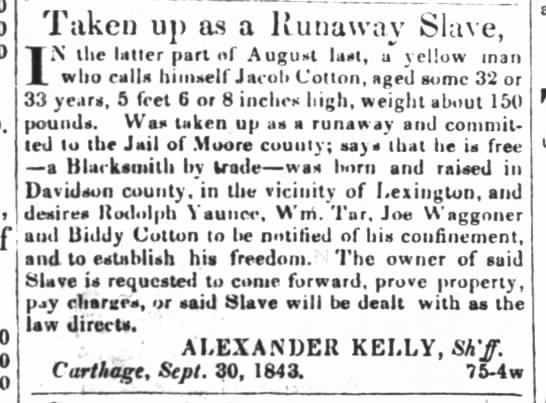 Fayetteville Weekly Observer
Fayetteville Weekly ObserverFayetteville, North Carolina25 Oct 1843, Wed • Page 1
Carthage is a beautiful little village, that was, in the 1800's, situated along the "Morganton Road", to Fayetteville. The people of Stanly County, which at the time, was simply known as the western half of Montgomery County, would cross the Yadkin-PeeDee River by ferry at Swift Island, pass through the county seat of Lawrenceville, through Lockey Simmons' tanyard, which would eventually become the town of Troy, and onward into Moore County to Carthage and Cameron beyond, on their way to the market town of Fayetteville.
Settled by primarily Scots coming up from the Cumberlands, Moore County was formed from Cumberland County and a site upon a hill, named Carthage for the historic town in North Africa, now Tunisia, was chosen as the county seat. Established in 1796, Carthage became known for a successful carriage industry, ran by local businessmen named Kelly, Tyson and Jones.
| Carthage holds a Buggy Festival every year in honor of its famed industry, which died out upon the advent of the Automobile. Courtesy of Moorealive.com. |
Jacob Cotton had requested that several people be notified of his containment and arrest, whom could verify his identity and his status as a free man.
First was 'Rodolph Younce', which actually, was Rudolph Younts. There were two Rudolph Younts in Davidson County at the time. Both were blacksmiths by trade,grandfather and grandson. The Younts/Younces were Germans from Berks County, Pennsylvania, part of that group of Pennsylvania Dutch who had came to what was then Rowan County in the westernmost settled area of the state and staked their claim around the Abbotts Creek Settlement.
| Name: | Rudolph Young [Rudolph Younts] [Rudolph Younk] |
|---|---|
| Home in 1830 (City, County, State): | Davidson, North Carolina |
| Free White Persons - Males - Under 5: | 1 |
| Free White Persons - Males - 5 thru 9: | 1 |
| Free White Persons - Males - 30 thru 39: | 1 |
| Free White Persons - Females - 5 thru 9: | 1 |
| Free White Persons - Females - 30 thru 39: | 1 |
| Free Colored Persons - Males - 10 thru 23: | 1 |
| Free White Persons - Under 20: | 3 |
| Free White Persons - 20 thru 49: | 2 |
| Total Free White Persons: | 5 |
| Total Free Colored Persons: | 1 |
| Total - All Persons (Free White, Slaves, Free Colored): | 6 |
In the 1830 census of Davidson County, Rudolph Younts is shown as having 1 male free person of color in his household, between the ages of 10 and 23. If Jacob Cotton was 32 or 33 in 1843, this could have very well have been him. Did he apprentice with Rudolph Younts? Is this where he learned his trade? He undoubtedly was very familiar with Jacob Cotton, if asked to stand witness as to his identity and status.
The second person requested, William Tarr, was a misnomer. I believe instead, it referred to William Andrew Darr, of which there were multiple generations of, as well. The father lived 1797 to 1866, and son living 1828-1895. They were farmers, and lived in the same general area as the Younts/Younce family, also being buried in the Pilgrim Reformed Church cemetery along with Rudolph Younts.
Part of the Abbott's Creek Pennsylvania Dutch Settlement, The Pilgrim Reformed Church was founded in 1757 by Valentine Leonhardt (Leonard). The cemetery is among the oldest in this part of North Carolina, with stones dating back to 1781. The church originally served both the Lutheran and German Reformed bodies, until the Lutherans split off and built their own church just a little ways away.
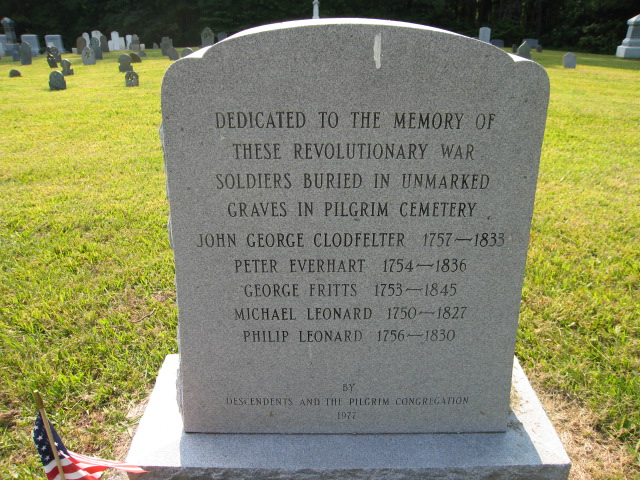 |
| Monument to Revolutionary War Soldiers buried at the Historic Pilgrim Reformed Church Cemetery |
The third person to appear in the list of persons to call to verify the identity of Jacob Cotton was Joseph Waggoner. Like the first two men, Joseph Waggoner was but one of a dynasty of Joseph Waggoners. Unlike the other two, Joseph Waggoner was a wealthy man, regarded as 'Joseph Waggoner, Esquire, and in the first half of the 19th century, is always shown as owning over 20 slaves. He and Squire Darr were also, obviously, both Whigs.
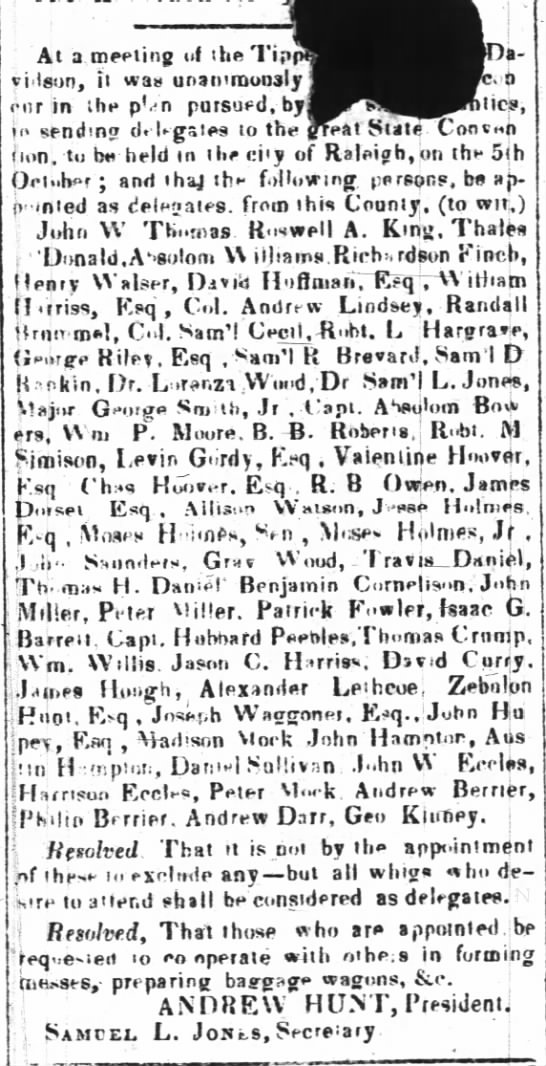
CLIPPED FROM
Carolina WatchmanSalisbury, North Carolina25 Sep 1840, Fri • Page 3
Joseph Waggoner owned large tracts of land and may have required the services of a blacksmith. Joseph Waggoner seemed of a different sort, not only wealthier, but more politically involved, and a crueler man, than Mr. Darr and Mr. Younts.
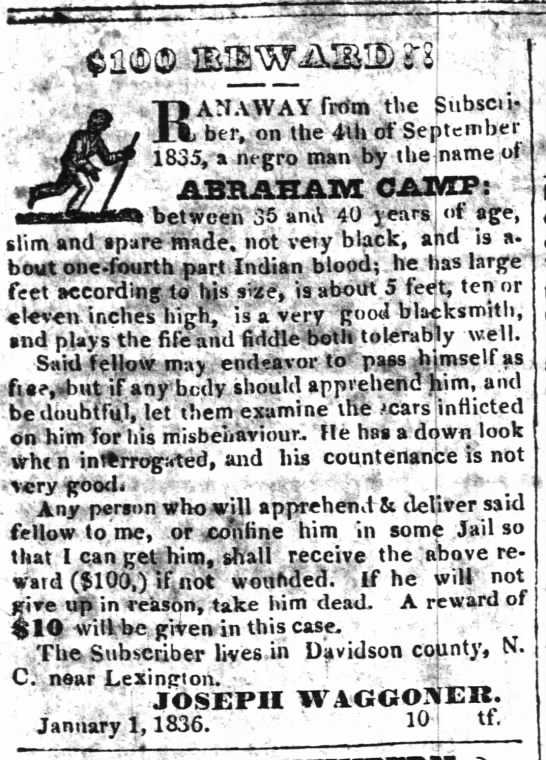
CLIPPED FROM
Weekly Raleigh RegisterRaleigh, North Carolina26 Jan 1836, Tue • Page 4
He advertised for his own runaway slaves and the ads told much in the way of his treatment of them and why they had ran away. The above left me again wondering of the fate of the rebellious Abraham Camp. Part Native-American, a talented blacksmith and musician to boot, it's told there he bore the scars of previous acts of disobedience, or just the human yearning for freedom.
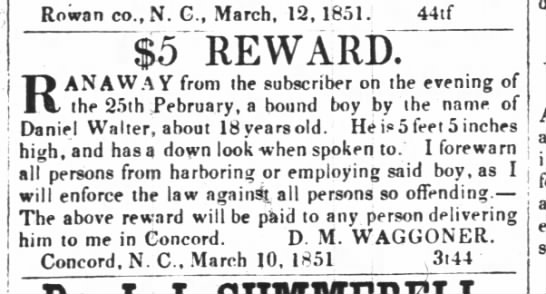
CLIPPED FROM
Carolina WatchmanSalisbury, North Carolina17 Mar 1851, Mon • Page 3
The Waggoners had no scruples concerning the mistreatment of white indentured servants, either. For Jacob Cotton to have requested the contact of a man whose value of the life of a slave was to consider them worth little more alive than dead, and not have much pity for the situation of life he put upon people he considered below his station, he must have had the confidence that Joseph Waggoner, Esquire, would validate his claim of being freeborn, as opposed to taking advantage of his imprisoned condition and claim him as a slave.
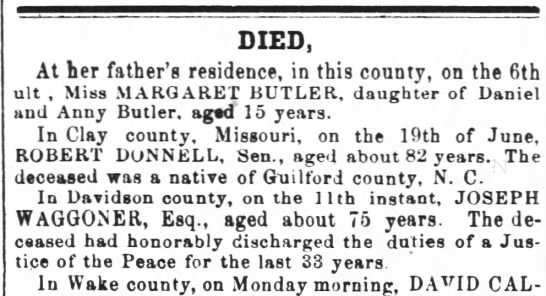
CLIPPED FROM
Fayetteville Semi-Weekly ObserverFayetteville, North Carolina13 Sep 1858, Mon • Page 3
A respected man, the testimony of Waggoner (sometimes seen as Wagner), should surely have held gravity with the Sheriff of Moore County.
The last witness, Biddy Cotton, was of a different sort entirely. First, she was female. Secondly, she bore the same surname as Jacob, himself.
I found Biddy Cotton in an 1830 census of Davidson County.
| Name: | Beddy Colton [Buddy Cotton] |
|---|---|
| Home in 1830 (City, County, State): | Davidson, North Carolina |
| Free White Persons - Females - 30 thru 39: | 2 |
| Free Colored Persons - Males - Under 10: | 1 |
| Free Colored Persons - Females - 10 thru 23: | 3 |
| Free White Persons - 20 thru 49: | 2 |
| Total Free White Persons: | 2 |
| Total Free Colored Persons: | 4 |
| Total - All Persons (Free White, Slaves, Free Colored): | 6 |
Beddy, or Biddy (or even Betty?) Cotton headed a family of 6, comprised of two White females in their 30's, 3 free females of color between 10 and 23, and one little boy, under ten, a free person of color.
What was Biddy's relationship to Jacob? Was this his wife? Were these his children? Or perhaps she was a sister. The 1843 ad would give his year of birth as 1810 or 1811. In 1830, he would have been 19 or 20. He was not the little boy.
But what about Jacob Cotton, himself? Did he appear in any census records, or any record at all, in the anuls of old Davidson? Was he telling the truth?
| Name: | Jacob Cotton |
|---|---|
| Gender: | Male |
| Spouse: | Elezabeth Fremon |
| Spouse Gender: | Female |
| Bond date: | 5 Sep 1840 |
| Bond #: | 000038071 |
| Level Info: | North Carolina Marriage Bonds, 1741-1868 |
| ImageNum: | 002759 |
| County: | Davidson |
| Record #: | 02 022 |
| Bondsman: | Thomas Bass |
| Witness: | P. Headrick, (J |
It appears that he was. Although he appears in no census records, he does appear in a marriage record, in 1840, over 20 years prior to the Civil War. He was a free man.
A search for anyone named Cotton in the 1840 census of Davidson County produced nothing. However, in Montogomery County, North Carolina, that not only borders Stanly County and Moore County, but also, briefly, borders Davidson County, there was a Thomas Cotton, whom I've heard more than a little bit about. Thomas Cotton was a wealthy landowner, a white man, and in 1840, he not only had slaves in his household, but free persons of color. Could this have been the family of Jacob Cotton? Was Biddy Cotton and Jacob Cotton in anyway connected to Thomas Cotton?
One very interesting thing to me in the marriage bond of Jacob Cotton to Elizabeth Freeman, was that the witness was P. Hedrick (or Headrick), Justice of the Peace, but the Bondsman was one Thomas Bass. I desend from a Bass. I recently discovered through the Y-DNA testing done by a distant cousin, that we descend from a man named John Bass, in Olde Viriginia, who married to a Nansemond Woman, a lady of the Indigenous Virginia tribe. I share dna with this cousin and his father, so I know there were no NPE's in between his and my connections to each other, so his lineage is mine. Since then, I was granted admitance to a DNA group of Nansemond descendants and that not only myself, but my brother and my son all share dna with members of the Nansemond tribe. It's in small amounts, and distant, but it is there.
While the Virginia Bass family spawned caucasian descendants, there also existed a rather extensive family of FPOC Basses throughout early Virginia and North Carolina.
| Name: | Thomas Bass |
|---|---|
| Home in 1830 (City, County, State): | Davidson, North Carolina |
| Free White Persons - Males - 40 thru 49: | 1 |
| Free Colored Persons - Males - 36 thru 54: | 1 |
| Free Colored Persons - Females - 10 thru 23: | 1 |
| Free White Persons - 20 thru 49: | 1 |
| Total Free White Persons: | 1 |
| Total Free Colored Persons: | 2 |
| Total - All Persons (Free White, Slaves, Free Colored): | 3 |
Thomas Bass first shows up in Davidson County in 1830. In his household was a white man in his 40's, a free man of color between 36 and 54, and a free woman of color between 10 and 23. On the same page was a Talitha Hatcher with a household of 4 Free persons of Color.
| Name: | Thomas Bass |
|---|---|
| Home in 1840 (City, County, State): | Davidson, North Carolina |
| Free White Persons - Females - 40 thru 49: | 1 |
| Free Colored Persons - Males - 10 thru 23: | 1 |
| Free Colored Persons - Males - 55 thru 99: | 1 |
| Persons Employed in Agriculture: | 1 |
| Persons Employed in Manufacture and Trade: | 1 |
| No. White Persons over 20 Who Cannot Read and Write: | 1 |
| Free White Persons - 20 thru 49: | 1 |
| Total Free White Persons: | 1 |
| Total Free Colored Persons: | 2 |
| Total All Persons - Free White, Free Colored, Slaves: | 3 |
In 1840, there was the same number of individulas as before, but the demographics were different. Now there was a white female in her 40's, a free man of color over 55, far too old to have been the same man as in 1830, and a young boy or man of color between 10 and 23. So, which one was Thomas Bass? Could the entire household have been free persons of color of varying pigmentation and just left to the opinion of various census takers as to the status of their race?
The 1850 census clears things up just a tad by offering better information, with one very interesting addition.
| Name: | Thomas Bass | ||||||||
|---|---|---|---|---|---|---|---|---|---|
| Age: | 72 | ||||||||
| Birth Year: | abt 1778 | ||||||||
| Birthplace: | North Carolina | ||||||||
| Home in 1850: | Southern Division, Davidson, North Carolina, USA | ||||||||
| Race: | Mulatto | ||||||||
| Gender: | Male | ||||||||
| Family Number: | 159 | ||||||||
| Household Members: |
|
Thomas Bass is given as a mulatto, himself. Eliza Bass, presumably his wife, is listed as white, and there is a little girl named Emeline Cotten or Cotton. Could she be related to Jacob Cotton? I bet she was. But it's 1850. Where is Jacob Cotton?
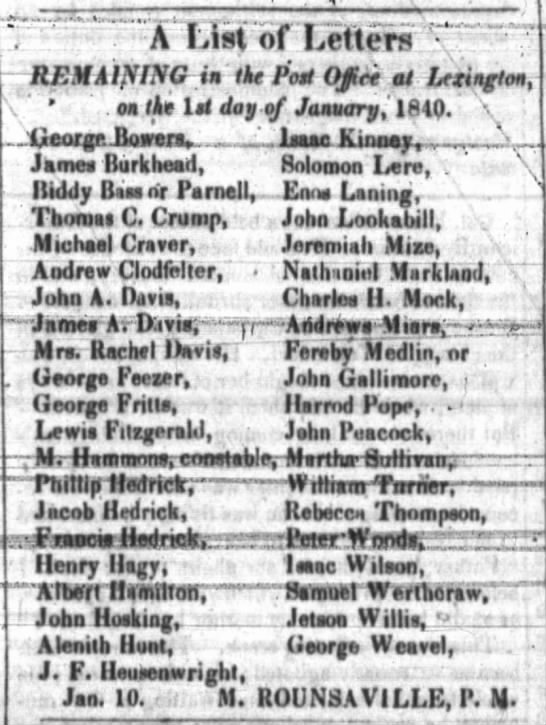 |
| A list of letters show a Biddy Bass -or Parnell- as having a letter neglected in Lexington. |
CLIPPED FROM
Western CarolinianSalisbury, North Carolina10 Jan 1840, Fri • Page 3
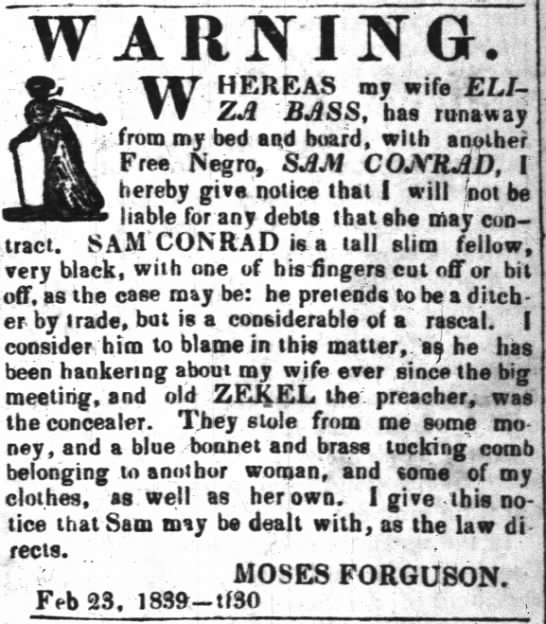 |
| A Moses Ferguson or Forguson claims his wife Eliza Bass ran off with another man, all FPOC. Was this the same Eliza Bass? |
CLIPPED FROM
Carolina WatchmanSalisbury, North Carolina08 Mar 1839, Fri • Page 4
This map shows the location of Moore County, in comparison to that of Davidson County. Jacob Cotton's path from Davidson County to Carthage, was most likely straight through Randolph County as the crow flies, a heavily Quaker area, where he would have felt safe.
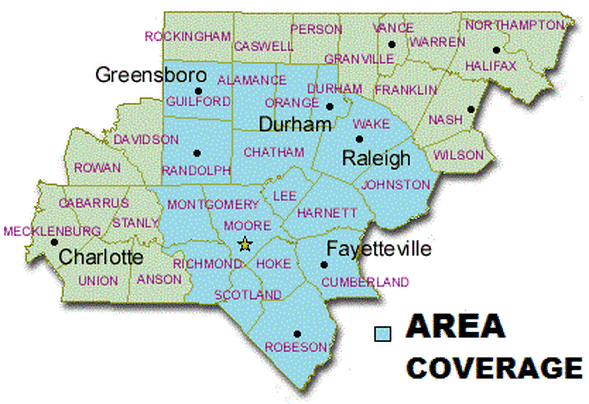
More Presbyterian Scotch than Quaker, Moore County had deep Revolutionary roots, as well as home to a number of slaveholders. Jacob Cotton was obviously not known in those parts. He said he was born and grew up in Davidson County. Had he any connection to the Montgomery County Cotton family just down river a bit, who had free persons of color in their household, or was he, like the Bass family, a member of a historically intermixed group of people that became to be known as "Tri-racial Isolates"?
From the website: Free African Americans of NC and Virginia, this court case was mentioned.
In 1725 John Cotton was indicted for marrying a "Molatto Man to a White woman"
Was this an ancestor of Jacob Cotton?
So, for some reason, perhaps to find work, Jacob Cotton had left a community of German descendants and traveled through an area dominated by Quakers, to a town where Scotch ancestry prevailed, having came up from Cumberland and the Cape Fear area, where no one knew him. Was he released to return to Davidson County?
The answer was, yes, he did make it home. But his time there was short-lived. Just two years later, Jacob did something that changed my whole outlook on him.

CLIPPED FROM
Carolina WatchmanSalisbury, North Carolina25 Oct 1845, Sat • Page 2
Mary West was a widow, living alone with her young grandson in Davie County, that borders Davidson. I found her in the 1840 census, living next to a John West, with a John Swink just down the page a little. Being described as aged, she would have been the woman 60 to 69 in 1840. It is unknown who the younger woman who was in her home at that time.
| Name: | Mary West |
|---|---|
| Home in 1840 (City, County, State): | Davie, North Carolina |
| Free White Persons - Females - 20 thru 29: | 1 |
| Free White Persons - Females - 60 thru 69: | 1 |
| No. White Persons over 20 Who Cannot Read and Write: | 2 |
| Free White Persons - 20 thru 49: | 1 |
| Total Free White Persons: | 2 |
| Total All Persons - Free White, Free Colored, Slaves: | 2 |
Apparently on an early autumn evening in 1845, just 2 years after his captivity in Carthage, Jacob Cotton got himself involved in a plot with 3 other men, David Valentine, Moses Parnell and Peyton Hasket. They planned to rob the old woman, considering her an easy target and knowledgable of the fact that she had a little bit of money, and as to where she kept it. The 4 men had gotten drunk before committing the horrible crime to gain courage. Upon being robbed, the old woman woke up and according to Jacob, his associate David Valentine hit her with a persimmon branch, knocking her unconscious and when the child, too woke up, he too, was beaten. The men continued the robbery and after they were finished, they assured the two were dead and set the house on fire.
| Name: | David Valentine [David Volentine] |
|---|---|
| Home in 1840 (City, County, State): | Rowan , North Carolina |
| Free Colored Persons - Males - 24 thru 35: | 1 |
| Free Colored Persons - Females - 10 thru 23: | 1 |
| Free Colored Persons - Females - 24 thru 35: | 1 |
| Persons Employed in Agriculture: | 1 |
| Total Free Colored Persons: | 3 |
| Total All Persons - Free White, Free Colored, Slaves: | 3 |
David Valentine, the "brains" behind this operation, was like Jacob Cotton, a free person of color. The Valentine family had long been one in the category dating back over a century into old Virginia. They were a rather migratory bunch, with one, William Valentine, even living in Albemarle in 1850. His family seemed centered in Rowan County, however, and that is where I found David Valentine in 1840. There was also an Eli Valentine in neighboring Davie County, where the crime occurred and the previously mentioned William Valentine, was at the time in Davidson County, where Jacob Cotton was from. David Valentine was likely a father, as there was a younger David Valentine, and possibly his brother, born just 3 years before the crime occurred, living in Davie County later, with what appears to be their grandparents.
| Name: | Moses Parnell |
|---|---|
| Home in 1840 (City, County, State): | Rowan, North Carolina |
| Free White Persons - Males - Under 5: | 2 |
| Free White Persons - Males - 5 thru 9: | 1 |
| Free White Persons - Males - 10 thru 14: | 1 |
| Free White Persons - Males - 15 thru 19: | 1 |
| Free White Persons - Males - 40 thru 49: | 1 |
| Free White Persons - Females - 5 thru 9: | 1 |
| Free White Persons - Females - 15 thru 19: | 1 |
| Free White Persons - Females - 40 thru 49: | 1 |
| Persons Employed in Agriculture: | 1 |
| Free White Persons - Under 20: | 7 |
| Free White Persons - 20 thru 49: | 2 |
| Total Free White Persons: | 9 |
| Total All Persons - Free White, Free Colored, Slaves: | 9 |
Peyton Hasket I find nothing on. Except that he may have hailed from Randolph County, as there was a Hasket in that area.
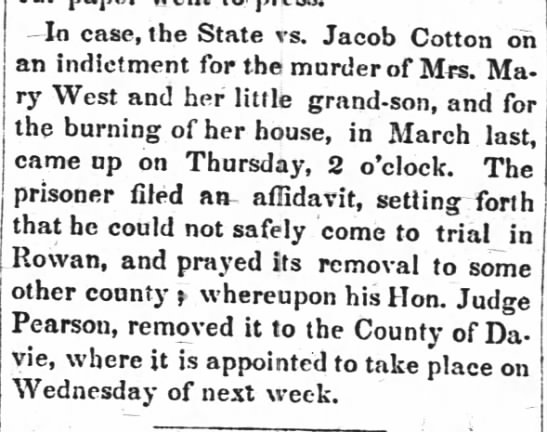
CLIPPED FROM
Carolina WatchmanSalisbury, North Carolina20 Sep 1845, Sat • Page 2
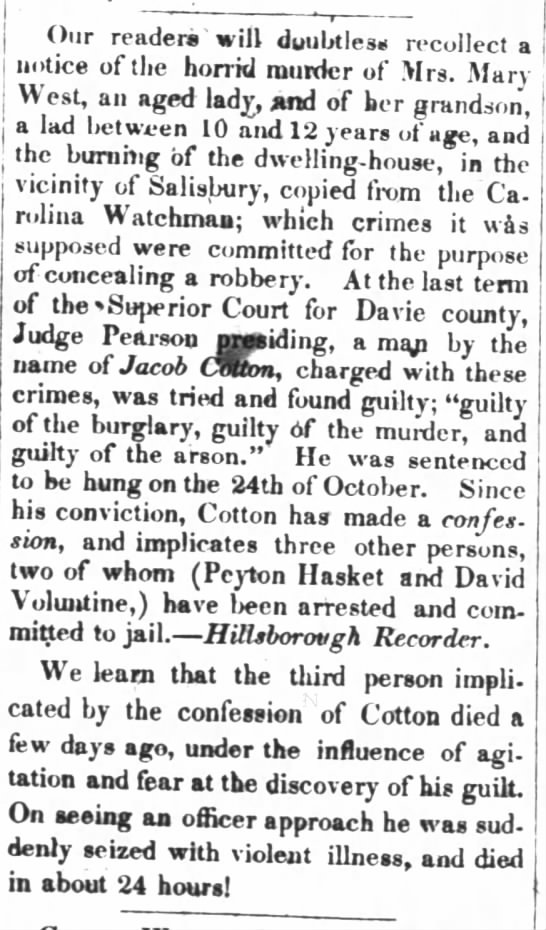
CLIPPED FROM
Fayetteville Weekly ObserverFayetteville, North Carolina15 Oct 1845, Wed • Page 3
So I now know the fate of Jacob Cotton. He was obviously freed from Chatham County, only to have participated in a horrible burgarly and murder of an elderly lady and her young grandson just two years later. Had he been up to no good when he was arrested in Chatham? We'll never know. So the story of Jacob Cotton should end there. But it didn't. He left descendants, two that I know of.
| Name: | Thomas Bass | ||||||||
|---|---|---|---|---|---|---|---|---|---|
| Age: | 72 | ||||||||
| Birth Year: | abt 1778 | ||||||||
| Birthplace: | North Carolina | ||||||||
| Home in 1850: | Southern Division, Davidson, North Carolina, USA | ||||||||
| Race: | Mulatto | ||||||||
| Gender: | Male | ||||||||
| Family Number: | 159 | ||||||||
| Household Members: |
|
Remember Thomas Bass, the bondsman for Jacob Cotton's marriage in 1840 to Eliza Freeman? Turns out that his wife, Eliza Bass, was the widow of Jacob Cotton. Young Emeline was the daughter of Jacob Cotton, and there was another child, a son, David, who remained in Davidson County. Biddy or Betty appears to be a nickname (modern Betty) for Elizabeth or Eliza.
| Name: | David Catton [David Calton] | ||||||||||
|---|---|---|---|---|---|---|---|---|---|---|---|
| Age in 1910: | 83 | ||||||||||
| Birth Year: | abt 1827 | ||||||||||
| Birthplace: | North Carolina | ||||||||||
| Home in 1910: | Conrad Hill, Davidson, North Carolina | ||||||||||
| Race: | Mulatto | ||||||||||
| Gender: | Male | ||||||||||
| Relation to Head of House: | Lodger | ||||||||||
| Marital status: | Widowed | ||||||||||
| Father's Birthplace: | North Carolina | ||||||||||
| Mother's Birthplace: | North Carolina | ||||||||||
| Native Tongue: | English | ||||||||||
| Occupation: | Herb Doctor | ||||||||||
| Industry: | Doctoring | ||||||||||
| Employer, Employee or Other: | Own Account | ||||||||||
| Able to Read: | No | ||||||||||
| Able to Write: | No | ||||||||||
| Neighbors: | |||||||||||
| Household Members: |
|
David worked as a laborer and an herb doctor, or 'medicine man'. Somehow, I believe this was a Native American family, at least in part. Very few census takers listed anyone as Native American until the 20th century. They were either black, white or mulatto. Anyone who didn't fit into the first two became the third, and some people flipflopped from one to the other during their lifetime depending upon who was trying to figure them out. Like David Cotton. If you notice, above, he is considered Mulatto. But just 10 years earlier -
| Name: | Cotten David [Cotteny David] | ||||||||||||
|---|---|---|---|---|---|---|---|---|---|---|---|---|---|
| Age: | 73 | ||||||||||||
| Birth Date: | Jun 1826 | ||||||||||||
| Birthplace: | North Carolina | ||||||||||||
| Home in 1900: | Conrad Hill, Davidson, North Carolina | ||||||||||||
| Sheet Number: | 3 | ||||||||||||
| Institution: | County Home of Old and Infirm (Lines to 17 Inclusive) | ||||||||||||
| Number of Dwelling in Order of Visitation: | 42 | ||||||||||||
| Family Number: | 42 | ||||||||||||
| Race: | White | ||||||||||||
| Gender: | Male | ||||||||||||
| Relation to Head of House: | Boarder | ||||||||||||
| Marital status: | Widowed | ||||||||||||
| Father's Birthplace: | North Carolina | ||||||||||||
| Mother's Birthplace: | North Carolina | ||||||||||||
| Occupation: | Physician | ||||||||||||
| Months Not Employed: | 0 | ||||||||||||
| Can Read: | No | ||||||||||||
| Can Write: | No | ||||||||||||
| Can Speak English: | Yes | ||||||||||||
| Neighbors: | |||||||||||||
| Household Members: |
|
He's in the County Home, listed as a doctor, and white. His mother, Eliza, or Betty/Biddy, was counted as white in 1850. She could have been, or she could have been just light skinned.
| Name: | Davidson Cotton |
|---|---|
| Gender: | Male |
| Race: | Black |
| Age: | 91 |
| Birth Date: | 10 Jun 1825 |
| Birth Place: | Davidson |
| Death Date: | 16 Sep 1916 |
| Death Place: | Conrad Hill, Davidson, North Carolina, USA |
When Davidson "David" Cotton died in 1916, at the age of 86, he was counted as "black". The man changed colors like a mood ring! Unlike his father, Jacob, however, the only time he made the newspapers was when he was elderly and living on the county dole, receiving a small stipend and living in the county home.
David was married to a woman named Jane for several years, but there were no children in the home. He, however, apparently also had a relationship with a woman whose surname was Beck, and together, they had 4 children, who named him as their father, the oldest being named Jacob. There was also another daughter who claimed him as father, and her mother as "Leah Loge". The mother was white. The children, who lived until modern times, claimed to be Native American. Oddly, the 1880 census shows the mother of these children, and the children, living right next door to David Cotton and his wife, Jane. As David Cotton named his father as Thomas Bass in one area, it makes one wonder. It was probably that Thomas Bass was the father who raised him, as his last name was Cotton, and he was born before Thomas Bass married Biddy. And who would want to claim a murderer as a father, but then, his oldest son by a young mistress is named "Jacob"?
| Name: | Charlie Tilden Beck |
|---|---|
| Race: | Indian (Native American) |
| Birth Date: | 5 May 1877 |
| Street address: | 2 |
| Residence Place: | Davidson, North Carolina, USA |
| Relative's Relationship: | Mother |
The above is the Draft card for one of the children of Polly Beck and David Cotton, listed as Indian, or Native American.
| Name: | Chas T Beck | ||||||||||
|---|---|---|---|---|---|---|---|---|---|---|---|
| Age in 1910: | 33 | ||||||||||
| Birth Year: | abt 1877 | ||||||||||
| Birthplace: | North Carolina | ||||||||||
| Home in 1910: | Conrad Hill, Davidson, North Carolina | ||||||||||
| Race: | Mulatto | ||||||||||
| Gender: | Male | ||||||||||
| Relation to Head of House: | Son | ||||||||||
| Marital status: | Single | ||||||||||
| Father's Birthplace: | North Carolina | ||||||||||
| Mother's name: | Mary Beck | ||||||||||
| Mother's Birthplace: | North Carolina | ||||||||||
| Native Tongue: | English | ||||||||||
| Occupation: | Farmer | ||||||||||
| Industry: | Gen Farm Work | ||||||||||
| Employer, Employee or Other: | Own Account | ||||||||||
| Able to Read: | No | ||||||||||
| Able to Write: | No | ||||||||||
| Neighbors: | |||||||||||
| Household Members: |
|
Then, here is the 1920 census, where the same individual is labeled as a mulatto. His mother and her sister are both listed as white, and his father, David is also listed as mulatto. It gets stranger yet. While in the military, on transport lists, etc, Charles goes by the surname of Cotton, and is an Indian in the miltitary, but by the time the poor man dies, he's white.
| Name: | Charles Tilton Beck |
|---|---|
| Gender: | Male |
| Race: | White |
| Age: | 82 |
| Birth Date: | 5 May 1877 |
| Birth Place: | Davidson, North Carolina, United States |
| Residence Place: | Lexington, Davidson, North Carolina |
| Death Date: | 8 Jun 1959 |
| Death Place: | Lexington, Davidson, North Carolina, USA |
| Mother: | Polly Beck |
| Area of where main body of Lumbee tribe is found. |
How can one individual cross back and forth between ethnicities so much? Thus was the life of someone caught between the color lines. My belief is that these were individuals who were members of displaced Indian tribes, who intermarried and interbred with the various other ethnicities around them, and sort of became their own personal montage, that didn't fit comfortably into any category.
| Lumbee Students at the Indian School in Robeston County via lumbee.library. appstate.edu. |
A look at any various members of the North Carolina Lumbee tribe will reveal a wide change in skin-tone and traits that reveal a gentically diverse biology.
So Jacob's son remained in Davidson County, where he was born. But how about his daughter, Emeline? She adds an additional odd piece to the puzzle.
| Name: | Emeline Cotten | ||||||||||||
|---|---|---|---|---|---|---|---|---|---|---|---|---|---|
| Age in 1870: | 29 | ||||||||||||
| Birth Year: | abt 1841 | ||||||||||||
| Birthplace: | North Carolina | ||||||||||||
| Dwelling Number: | 866 | ||||||||||||
| Home in 1870: | Pittsboro Road North Side, Chatham, North Carolina | ||||||||||||
| Race: | Black | ||||||||||||
| Gender: | Female | ||||||||||||
| Post Office: | Pittsboro | ||||||||||||
| Occupation: | Keeping House | ||||||||||||
| Cannot Read: | Y | ||||||||||||
| Cannot Write: | Y | ||||||||||||
| Disability Condition: | Y | ||||||||||||
| Inferred Father: | Jackson Cotten | ||||||||||||
| Household Members: |
|
Emeline ends up in Chatham County, where she marries another Cotton, so her surname never changes, and is buried at the Union Grove, AME Zion Methodist Church. It appears Jacob Cotton may have been in Chatham visiting family. How was he related to the Chatham County Cottons?
So, this is how is the fate of the nomadic, displaced Native Americans of the 1800's in Piedmont, NC turned out. The children of Jacob's son David, claimed to be "Indians" and by virtue of the race of their mother, Polly Beck, intermarried into the white community and their descendants are today, persons one would label "white". Emaline, who married another of her ambigous race in a different county, had descendants who intermarried into the African-American community and are today, persons one would label white. Both groups are tri-racial. They are related. They are family. And all members of the one, very large family, called the Human Race.

No comments:
Post a Comment